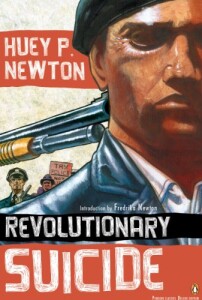Book Review: Revolutionary Suicide by Huey P. Newton
 Revolutionary Suicide by Huey P. Newton
Revolutionary Suicide by Huey P. Newton
Publisher: Penguin Classics: September 29, 2009
First published in 1973
My rating: 5 of 5 stars
Publisher’s Description:
In October 1967, one year after the founding of the Black Panther Party, Huey Newton was involved in a shooting during which an Oakland police officer was killed. Newton spent three years in prison before being released and having his charges dismissed, and his jailing brought cries of “Free Huey” from supporters around the world. This engrossing and well-written autobiography recounts the forming of a revolutionary and shows how the degrading and psychologically destructive penal system forged Newton’s already growing spirit. When Newton was a child, his father instilled in him a sense of dignity and pride; as an adolescent, he was torn between religious principles and life as a hustler; as a young man, he founded the radical Black Panther Party with Bobby Seale, and finally, in solitary confinement in the Alameda County Jail, he reached deep within himself to find the strength to face adversity; and even death without fear.
I didn’t know much about the Black Panther Party or Huey P. Newton before reading this book – only what I was “taught” in school. And I don’t think Huey P. Newton was mentioned at all. He was an amazing human being. He was functionally illiterate when he graduated from high school and taught himself to read using Plato’s Republic. Not Dick and Jane – Plato! After that, he read widely and formed a lot of the Black Panther’s philosophy from the books he read – Karl Marx, Mao Zedong and the like. He was very intelligent and a great strategist.
In many ways, Black people’s interactions with the police have actually gotten worse since that time. The Black Panthers openly carried firearms in public. Can you imagine if Black people tried to do that today? They also carried law books with them and would read from them to police officers when police officers were trying to wrongly arrest somebody something or otherwise violate a person’s rights. If a Black person tried to pull out a law book today during a police encounter, it would not go over well. The policeman would get mad and the situation would escalate. But back then, it actually worked sometimes.
Sometimes the Black Panthers would come across a policeman stopping a citizen and they would stand at a distance with their weapons to let the police know that they were being watched. Today, people do the same thing by pulling out their cell phones to record these situations. It’s sad that over forty years later, the police still need bystanders to hold them accountable for their behavior.
I learned a lot about Newton and the Black Panthers from reading this book. I still have more to learn and plan on seeking out more books about this topic and time in history. Highly recommended.




